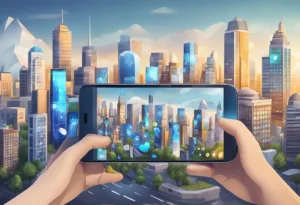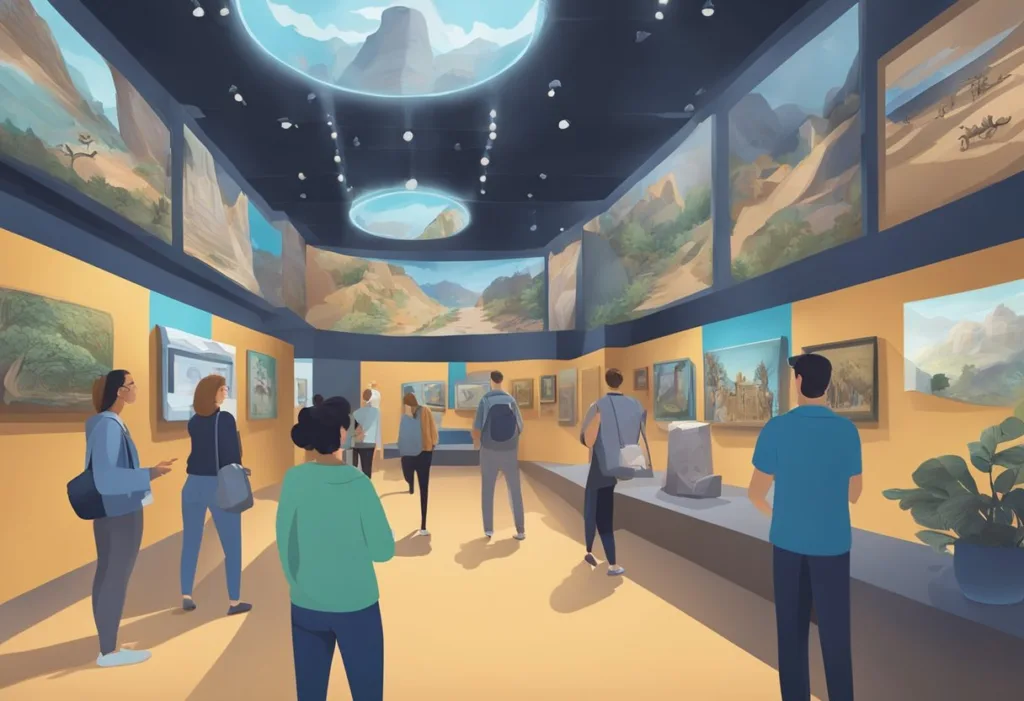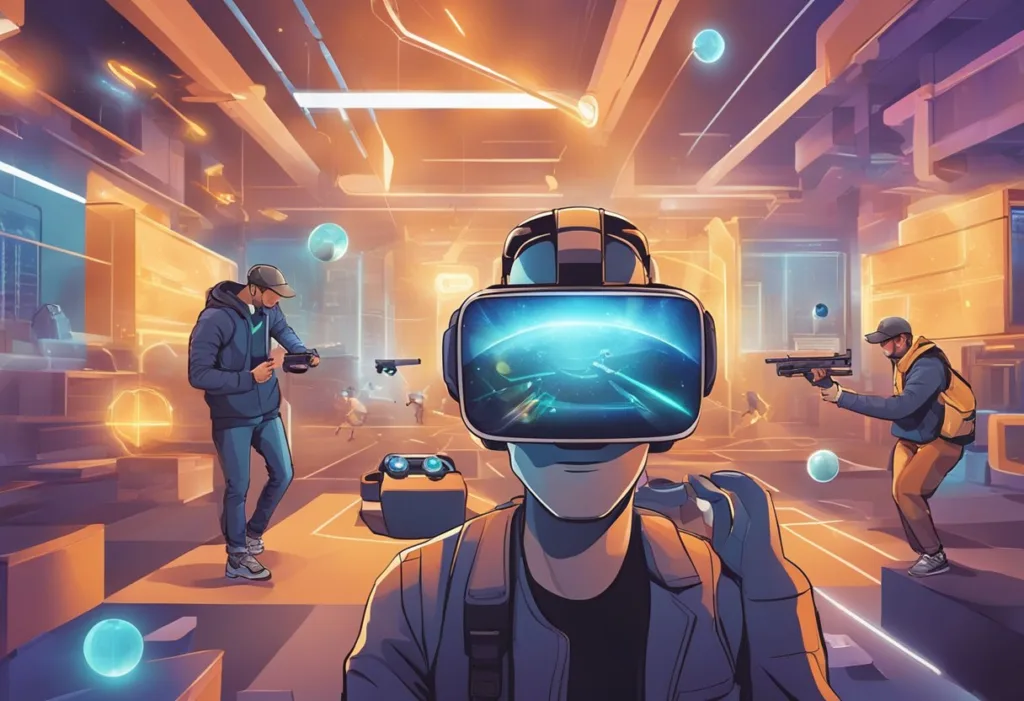The metaverse is a term that has been gaining popularity in recent years, especially with the advancement of technology. It refers to a virtual world where people can interact with each other in a more immersive way than is currently possible with the internet. The metaverse is essentially a three-dimensional space that can be accessed through virtual reality (VR) and augmented reality (AR) technologies.
One of the most exciting aspects of the metaverse is the potential it has for social interaction. In a world where so much of our communication is done through screens, the metaverse offers a more personal and engaging way to connect with others. It is also a space where people can explore and create, whether that be through art, music, or other forms of expression. As the technology behind the metaverse continues to improve, it is likely that we will see more and more people flocking to this new digital frontier.
Defining the Metaverse
The term “metaverse” was first coined by Neal Stephenson in his 1992 science fiction novel, Snow Crash. The book describes a virtual world where people can interact with each other and digital objects in a fully immersive environment. Since then, the concept of the metaverse has been explored in various forms of media, including movies, TV shows, and video games.
Historical Context
The idea of a virtual world has been around for decades, but it wasn’t until the advent of virtual reality (VR) and augmented reality (AR) technologies that it became a tangible reality. In recent years, the metaverse has gained renewed interest due to the growing popularity of VR and AR devices, such as the Oculus Rift and Microsoft HoloLens.
Core Technologies
The metaverse is built on a number of core technologies, including VR and AR, blockchain, and cloud computing. VR and AR technologies provide the immersive environment that allows users to interact with each other and digital objects in a realistic way. Blockchain technology provides the security and transparency needed to support a virtual economy, while cloud computing provides the scalability and flexibility needed to support a large user base.
The metaverse is a vision of a fully immersive digital world where people can interact with each other and digital objects in a way that is as natural as the physical world. While the metaverse is still in its early stages, it has the potential to revolutionize the way we interact with each other and the world around us.
Technological Foundations of the Metaverse
Spatial Computing
The concept of the metaverse is built on the idea of a virtual space that is accessible to users from anywhere in the world. Spatial computing is a key technology that enables this concept to become a reality.
It involves the use of virtual and augmented reality technologies to create immersive digital environments that can be experienced by users in real-time. Spatial computing is essential for creating the immersive and interactive experiences that are central to the metaverse.
Blockchain and NFTs
Blockchain technology and non-fungible tokens (NFTs) are also important technological foundations of the metaverse. Blockchain technology provides a secure and decentralized infrastructure that can be used to connect users and applications across the metaverse. This technology enables interoperability between different applications and platforms, which is essential for creating a seamless and connected metaverse.
NFTs, on the other hand, provide a way to represent and transfer ownership of digital assets within the metaverse. These assets can include virtual real estate, digital art, and other digital items that can be bought, sold, and traded within the metaverse.
NFTs provide a way to create a digital economy within the metaverse, which is essential for creating a sustainable and thriving ecosystem.
The technological foundations of the metaverse are diverse and complex, involving technologies such as spatial computing, blockchain, and NFTs. These technologies provide the infrastructure and tools necessary to create a seamless and connected metaverse that is accessible to users from anywhere in the world.
Social and Economic Impact of the Metaverse
The metaverse is expected to have a significant impact on both the social and economic aspects of society. This section will discuss the expected changes in the digital economy and virtual markets.
Digital Economy
The metaverse is expected to create new opportunities for businesses and individuals in the digital economy. As the metaverse grows, it is expected to become a new platform for e-commerce, marketing, and shopping. This new platform will provide businesses with new ways to reach customers and create value. The metaverse will also create new jobs in fields such as software development, design, and content creation.
Virtual Markets
Virtual markets are expected to be a significant part of the metaverse. These markets will allow users to buy and sell virtual goods and services. The virtual goods market is already a significant part of the digital economy, with games like Fortnite and Roblox generating billions of dollars in revenue from in-game purchases. The metaverse is expected to take this to the next level, creating a new market for virtual goods and services.
The metaverse is expected to have a significant impact on the digital economy and virtual markets. It will create new opportunities for businesses and individuals, and it will provide a new platform for e-commerce, marketing, and shopping. The virtual goods market is expected to be a significant part of the metaverse, creating a new market for virtual goods and services.
User Interaction and Experience
The metaverse is a virtual world where users can interact with each other and their environment. User interaction and experience are two essential aspects of the metaverse. Users can create and customize their avatars, which are digital representations of themselves, to navigate the virtual world.
Avatars and Personalization
Avatars are an essential element of the metaverse. Users can create and customize their avatars to look like themselves or whoever they want to be. Avatars can wear different clothes, accessories, and even have unique abilities. Personalization is essential to make the user feel comfortable and engaged in the virtual world.
Virtual Communities
Virtual communities are groups of users with common interests or goals. Users can join these communities to interact with like-minded people. These communities can be anything from gaming groups to social clubs. The metaverse provides a platform for users to connect and interact with people from all over the world.
The metaverse provides an immersive experience for users, allowing them to teleport to different locations and have unique experiences. The social connection and sense of community that the metaverse provides are crucial to its success. The metaverse is still in its early stages, and there is much to develop to make it more accessible and user-friendly.

Metaverse Platforms and Companies
The Metaverse is a rapidly growing industry with a variety of platforms and companies vying for dominance. Here we will discuss some of the major players and emerging startups in the Metaverse industry.
Major Players
Meta
Meta, formerly known as Facebook, is one of the biggest players in the Metaverse industry. With its acquisition of Oculus in 2014, Meta has been investing heavily in virtual reality and augmented reality technologies. Meta aims to create a fully immersive Metaverse experience that allows users to interact with each other and with digital objects in a seamless way.
Microsoft
Microsoft is another major player in the Metaverse industry. The company’s Mixed Reality platform allows users to create and share virtual experiences using a variety of devices, including HoloLens and Windows Mixed Reality headsets. Microsoft has also been investing in cloud gaming, which could play a significant role in the future of the Metaverse.
NVIDIA
NVIDIA is a leading provider of graphics processing units (GPUs) that are essential for creating high-quality virtual environments. The company’s GPUs are used by many Metaverse platforms and companies, including Fortnite and Roblox.
Roblox
Roblox is a popular Metaverse platform that allows users to create and share their own virtual experiences. The platform has over 200 million active users and has been valued at over $40 billion. Roblox is particularly popular among younger users and has been called the “YouTube of gaming.”
Emerging Startups
Decentraland
Decentraland is a blockchain-based Metaverse platform that allows users to create and own virtual land. The platform uses a cryptocurrency called MANA to facilitate transactions and allows users to create their own virtual experiences using a variety of tools.
Somnium Space
Somnium Space is another blockchain-based Metaverse platform that allows users to create and own virtual land. The platform has a focus on virtual real estate and allows users to buy and sell virtual land using cryptocurrency.
Sandbox
Sandbox is a Metaverse platform that allows users to create and share their own virtual experiences. The platform has a focus on gaming and allows users to create games using a variety of tools. Sandbox has been valued at over $1 billion and has partnerships with several major companies, including Atari and Square Enix.
The Metaverse industry is filled with a variety of platforms and companies, each with their own unique strengths and weaknesses. As the industry continues to grow, it will be interesting to see which companies emerge as the dominant players in this exciting new space.

Content Creation and Development
Tools for Creators
The Metaverse offers a wide range of tools for creators to develop immersive experiences. Creators can use virtual reality and other new technologies to create content for the Metaverse. They can also repurpose traditional content types for the Metaverse. Nobody fully knows what types of content will populate these virtual worlds in the coming years.
One of the most popular tools for content creation in the Metaverse is Unity. Unity is a cross-platform game engine that allows creators to build and deploy immersive experiences across multiple platforms. It provides a robust set of tools for designing, building, and testing immersive experiences.
Another popular tool for content creation in the Metaverse is Unreal Engine. Unreal Engine is a game engine developed by Epic Games that provides a suite of tools for creating immersive experiences. It is known for its high-quality graphics and advanced physics simulation.
Developer Ecosystem
The Metaverse has a thriving developer ecosystem that is constantly evolving. Developers can create applications and services that run on top of the Metaverse platform. This ecosystem includes tools for building, testing, and deploying immersive experiences.
The Metaverse also has a robust community of developers who share their knowledge and expertise with others. This community includes forums, online communities, and developer meetups. Developers can collaborate with others to build and deploy immersive experiences.
To the developer ecosystem, the Metaverse has a growing hardware ecosystem. This includes devices such as VR headsets, haptic feedback devices, and motion controllers. These devices provide a more immersive experience for users and enable developers to create more engaging content.
Security, Privacy, and Ethics
Data Protection
As the metaverse continues to grow and evolve, concerns over data protection and privacy have become increasingly important. Users of the metaverse are providing a wealth of personal information, including their location, browsing history, and even biometric data. Therefore, it is essential that metaverse companies adopt robust data protection measures to ensure user privacy and security.
One way to protect user data is through end-to-end encryption. This technology ensures that data is encrypted from the moment it is sent until it reaches its intended recipient. This approach can help to prevent unauthorized access to user data and protect against data breaches.
Another approach is to give users more control over their data. By allowing users to decide what data is collected and how it is used, metaverse companies can help to build trust with their users and promote responsible data practices.
Responsible Innovation
As the metaverse continues to evolve, it is important that companies prioritize responsible innovation. This means taking steps to ensure that the metaverse is developed in a way that is safe, inclusive, and ethical.
One way to promote responsible innovation is through the use of ethical design principles. These principles can help to ensure that the metaverse is developed in a way that is respectful of user privacy and promotes responsible data practices. This can include things like minimizing data collection, ensuring transparency around data use, and providing users with control over their data.
Another important consideration is the prevention of misinformation and abuse. Metaverse companies should take steps to prevent the spread of false information and ensure that users are protected from abuse and harassment. This can include things like content moderation, user reporting mechanisms, and the development of clear community guidelines.
Commercial Opportunities
Branding in the Metaverse
The Metaverse offers a unique opportunity for brands to reach a global audience in an immersive and interactive environment. Brands can create virtual experiences that allow users to interact with their products and services in a way that is not possible in the physical world. This creates a new level of engagement with consumers that can lead to increased brand loyalty and sales.
Moreover, brands can use the Metaverse to create a new level of personalization in their marketing efforts. By using data collected from user interactions, brands can create targeted advertising campaigns that are tailored to individual users’ preferences and interests. This can lead to higher conversion rates and a better return on investment for marketing campaigns.
Investment and Growth
Investing in the Metaverse offers significant growth potential for savvy investors. Cryptocurrencies such as Bitcoin and Ethereum have seen significant growth in recent years, and the Metaverse is poised to be the next big thing in the world of digital assets. Investors can take advantage of this growth by investing in Metaverse-related companies or by purchasing Metaverse assets such as virtual real estate.
In addition to investment opportunities, the Metaverse also offers growth potential for businesses that are willing to adapt to this new environment. Companies that are able to create compelling virtual experiences for users can gain a competitive advantage in the marketplace. This can lead to increased sales and revenue growth over time.
The Metaverse offers a range of commercial opportunities for brands, investors, and businesses. By taking advantage of these opportunities, companies can position themselves for long-term success in this exciting new digital landscape.
Metaverse in Different Industries
Healthcare and Education
The metaverse has the potential to revolutionize the healthcare and education sectors. In healthcare, medical professionals can use the metaverse to simulate surgeries, train new doctors, and collaborate with colleagues from different parts of the world.
The metaverse can also be used to create virtual reality therapy sessions for patients with mental health issues. In education, the metaverse can be used to create immersive learning experiences for students. For example, students can visit historical sites or explore science concepts in a virtual environment.
Entertainment and Real Estate
The entertainment industry has already started exploring the possibilities of the metaverse. Gaming companies are creating immersive gaming experiences that allow players to interact with each other in a virtual world. The metaverse can also be used to create virtual concerts, movie theaters, and sports events. In the real estate industry, the metaverse can be used to create virtual property tours, allowing potential buyers to explore properties from the comfort of their own homes. Virtual real estate can also be sold and traded in the metaverse, creating a new market for investors.
The metaverse has the potential to transform various industries, from healthcare to entertainment to real estate. As technology continues to advance, it is likely that the metaverse will become more prevalent in our daily lives.
Future Trends and Predictions
Evolving Technologies
The metaverse is a constantly evolving concept, and as such, it is likely to be shaped by emerging technologies in the coming years. One of the most significant trends is the rise of generative AI, which uses machine learning algorithms to create new content autonomously. This could have a transformative impact on the metaverse, allowing for the creation of vast, immersive worlds that are constantly evolving and adapting to user input.
Another key area of development is artificial intelligence, which is likely to play an increasingly important role in shaping the metaverse. AI could be used to create more realistic and nuanced virtual characters, as well as to power advanced chatbots and other conversational interfaces.
Cultural Shifts
As the metaverse becomes more mainstream, it is likely to have a significant impact on culture and society. One of the most significant changes could be the blurring of boundaries between the physical and virtual worlds. This could lead to a world in which people spend more time in virtual environments than in the real world, and where the line between reality and simulation becomes increasingly blurred.
Another potential cultural shift is the rise of the multiverse, a concept in which multiple parallel universes coexist and interact with one another. This could have profound implications for the way we think about reality, as well as for the way we interact with each other and with the world around us.
The future of the metaverse is likely to be shaped by a combination of evolving technologies and cultural shifts. As futurists continue to explore the possibilities of this exciting new concept, it is clear that the metaverse has the potential to transform the way we think about everything from entertainment and education to work and social interaction.

Frequently Asked Questions
What are the leading platforms in the metaverse space?
Currently, there are several platforms in the metaverse space, including Decentraland, Somnium Space, and The Sandbox. These platforms offer users the ability to create, explore, and interact with virtual worlds. Each platform has its unique features, and users can choose the one that best suits their preferences.
Which companies are pioneering metaverse development?
Several companies are pioneering metaverse development, including Facebook, Microsoft, and Nvidia. These companies are investing heavily in research and development to create immersive and engaging virtual experiences for users. They are also partnering with other companies to create new technologies that will enhance the metaverse experience.
How will virtual reality (VR) technology shape the metaverse?
Virtual reality technology is a critical component of the metaverse experience. It allows users to immerse themselves in virtual worlds and interact with other users in real-time. VR technology is continually evolving, and developers are working to create more realistic and engaging experiences for users.
What are some prominent examples of metaverse applications?
Metaverse applications are diverse, and there are many examples of how they can be used. For example, virtual real estate is becoming a popular investment opportunity, and some users are creating virtual businesses within the metaverse. Other applications include virtual concerts, gaming, and social experiences.
How can users access and navigate within the metaverse?
Users can access the metaverse through various platforms and devices, including computers, VR headsets, and mobile devices. Navigation within the metaverse is typically done through a combination of traditional input devices, such as keyboards and mice, and VR controllers. The user interface is continually evolving, and developers are working to create more intuitive and user-friendly experiences.
What potential impacts could the metaverse have on social media and online interaction?
The metaverse has the potential to revolutionize social media and online interaction. It offers users a more immersive and engaging experience than traditional social media platforms, allowing them to interact with others in real-time and in virtual environments. It could also lead to new business opportunities and revenue streams for companies that invest in metaverse development. However, there are also concerns about privacy and security, and developers must work to address these issues to ensure user safety and trust.














